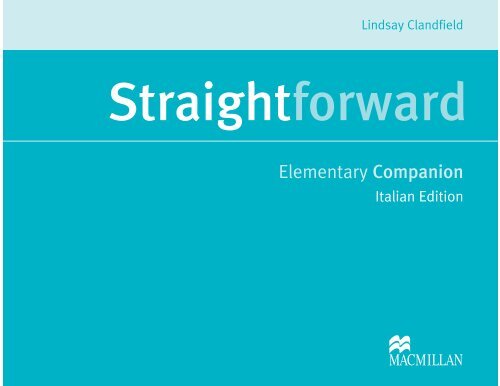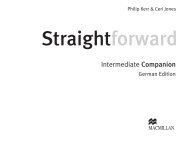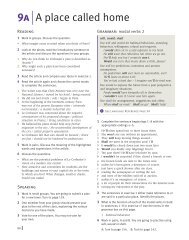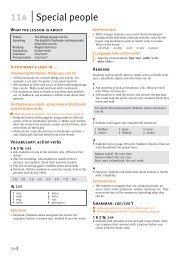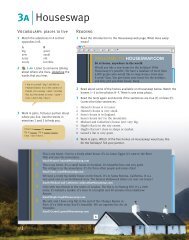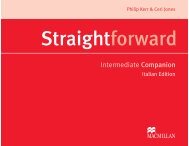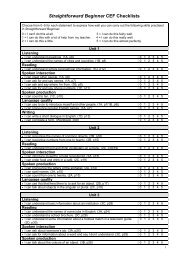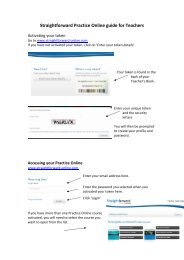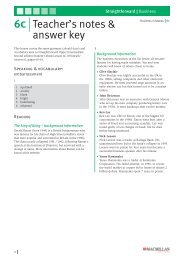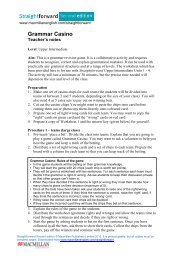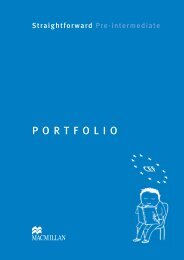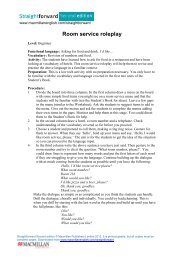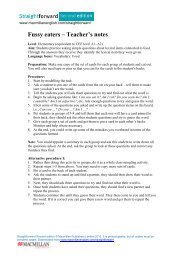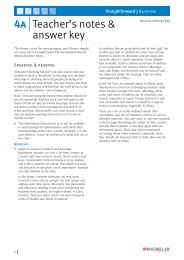Italian - Straightforward
Italian - Straightforward
Italian - Straightforward
- No tags were found...
You also want an ePaper? Increase the reach of your titles
YUMPU automatically turns print PDFs into web optimized ePapers that Google loves.
Lindsay Clandfield<strong>Straightforward</strong>Elementary Companion<strong>Italian</strong> Edition
Lindsay Clandfield<strong>Straightforward</strong>Elementary Companion<strong>Italian</strong> Edition
Macmillan EducationBetween Towns Road, Oxford, OX4 3PP, UKA division of Macmillan Publishers LimitedCompanies and representatives throughout the worldISBN 13: 978-1-4050-9527-3ISBN 10: 1-4050-9527-XText, design and illustration © Macmillan Publishers Limited 2006First published 2006All rights reserved; no part of this publication may be reproduced,stored in a retrieval system, transmitted in any form, or by any means,electronic, mechanical, photocopying, recording, or otherwise,without the prior written permission of the publishers.Page make-up by Anne SherlockIllustrated by Mark Duffin p31Printed in Spain by Edelvives2010 2009 2008 2007 200610 9 8 7 6 5 4 3 2 1
CONTENTSWORDLISTBasics 1Unit 1 4Unit 2 6Unit 3 9Unit 4 12Unit 5 14Unit 6 16Unit 7 18Unit 8 20Unit 9 21Unit 10 23Unit 11 26Unit 12 28LANGUAGE REFERENCE 30
Welcome to the <strong>Straightforward</strong> Elementary Companion!What information does the <strong>Straightforward</strong> Elementary Companion give you?• a word list of key words and phrases from each unit of <strong>Straightforward</strong> Elementary Student’s Book• pronunciation of the key words and phrases• translations of the key words and phrases• sample sentences showing the key words and phrases in context• a summary of the Language Reference from <strong>Straightforward</strong> Elementary Student’s BookAbbreviations used in the Companion(v)(adj)(n)verbadjectivenoun(phr v) phrasal verb(prep) preposition(pron) pronoun(n pl) plural noun(C) countable(U) uncountableVOWELS AND DIPHTHONGS/I/ big fish /bIg fIS//i…/ green beans /gri…n bi…nz//U/ should look /SUd lUk//u…/ blue moon /blu… mu…n//e/ ten eggs /ten egz//´/ about mother /´baUt møD´(r)//‰…/ learn words /l‰…n w‰…dz//O…/ short talk /SO…t tO…k//œ/ fat cat /fœt kœt//ø/ must come /møst køm//A…/ calm start /kA…m stA…t//Å/ hot spot /hÅt spÅt//I´/ ear /I´(r)//eI/ face /feIs//U´/ pure /pjU´(r)//OI/ boy /bOI//´U/ nose /n´Uz//e´/ hair /he´(r)//aI/ eye /aI//aU/ mouth /maUT/CONSONANTS/p/ pen /pen//b/ bad /bœd//t/ tea /ti…//d/ dog /dÅg//tS/ church /tS‰…tS//dZ/ jazz /dZœz//k/ cost /kÅst//g/ girl /g‰…l//f/ far /fa…(r)//v/ voice /vOIs//T/ thin /TIn//D/ then /Den//s/ snake /sneIk//z/ noise /nOIz//S/ shop /SÅp//Z/ measure /meZ´(r)//m/ make /meIk//n/ nine /naIn//N/ sing /sIN//h/ house /haUs//l/ leg /leg//r/ red /red//w/ wet /wet//j/ yes /jes/
BasicsInternational wordsairport (n)bus (n)coffee (n)football (n)hotel (n)hospital (n)mobile phone (n)pizza (n)police (n)sandwich (n)taxi (n)tea (n)\"e´pO…t\\bøs\\"kÅfi\\"fUtbO…l\\h´U"tel\\"hÅspItl\\m´UbaIl "f´Un\\"pi…ts´\\p´"li…s\\"sœnwItS\\"tœksi\\ti…\aeroportoautobus, buscaffèfootball, calciohotel, albergoospedalecellularepizzapoliziasandwich, paninotaxitèWe had a terrible time at the airport … our bags were mixed up.A bus is a large public vehicle that you pay to travel on and usually takesyou short distances.“Would you like a drink, Rob?” “Yes please, coffee.”Football is a game in which two teams of eleven players kick a round balland try to score goals.“Hello Sam. Where are you?” “In the hotel.”A hospital is a place where people go when they are ill or injured.Rob’s mobile phone was just covered in water.A pizza is a food that consists of flat round bread with tomato, cheese,vegetables, meat etc on it.Police are people who try to catch criminals and make people obey thelaw.A sandwich is a light meal that consists of meat, cheese, egg etc betweentwo pieces of bread.A taxi is a car with a driver who you pay to take you to a particular place.“Would you like a drink?” “Tea, please.”1Numbersone \wøn\unoOne is the number 1.two \tu…\dueTwo is the number 2.three \Tri…\treThree is the number 3.four \fO…\quattroFour is the number 4.five \fAIv\cinqueFive is the number 5.six \sIks\seiSix is the number 6.seven \"sevn\setteSeven is the number 7.eight \eIt\ottoEight is the number 8.nine \naIn\noveNine is the number 9.ten \ten\dieciTen is the number 10.
Classroom Englishwrite (v)listen to (v)open (v)close (v)look at (v)read (v)talk (v)book (n)word (n)partner (n)picture (n)text (n)CD (n)\raIt\\"lIsn t´\\"´Upn\\kl´Uz\\"lUk ´t\\ri…d\\tO…k\\bUk\\w‰…d\\"pA…tn´\\"pIktS´\\tekst\\si… "di…\scrivereascoltareaprirechiudereguardareleggereparlarelibroparolapartnerimmagine, illustrazionetestoCDListen and write the letters you hear.Read and listen to the dialogue.Open your books.Close your books.Look at the pictures.Read and listen to the dialogue.Talk to your partner.Open your books, please.Point to the words you hearWork with a partner and ask questions.Look at the pictures.Read the text.Listen to the CD.Days of the week2MondayTuesdayWednesdayThursdayFridaySaturdaySunday\"møndeI\\"tSu…zdeI\\"wenzdeI\\"T‰…zdeI\\"fraIdeI\\"sœt´deI\\"søndeI\lunedìmartedìmercoledìgiovedìvenerdìsabatodomenicaMonday is the day after Sunday and before Tuesday.Tuesday is the day after Monday and before Wednesday.Wednesday is the day after Tuesday and before Thursday.Thursday is the day after Wednesday and before Friday.Friday is the day after Thursday and before Saturday.Saturday is the day after Friday and before Sunday.Sunday is the day after Saturday and before Monday.Coloursblack (adj)blue (adj)brown (adj)green (adj)grey (adj)\blœk\\blu…\\braUn\\gri…n\\greI\nero (a)blu, azzurro (a)marroneverdegrigio (a)Black is the darkest colour, like the sky at night when there is no light.Blue is the same colour as the sky on a clear, sunny day.Brown is the same colour as wood or coffee.Green is the same colour as grass.Something that is grey is between black and white in colour.
ed (adj)white(adj)yellow (adj)\red\\waIt\\'jel´U\rosso (a)bianco (a)giallo (a)Something that is red is the same colour as blood.Something that is white is the same colour as milk or snow.Something that is yellow is the same colour as the middle of an egg.Things around youapple (n)board (n)CD player (n)coin (n)door (n)earring (n)ID card (n)key (n)pen (n)photo (n)sweet (n)TV (n)wallet (n)window (n)\"œpl\\bO…d\\si… "di… pleI´\\kOIn\\dO…\\"I´rIN\\aI "di… kA…d\\ki…\\pen\\"f´Ut´U\\swi…t\\ti… "vi…\\"wÅlIt\\"wInd´U\melalavagnalettore CDmonetaportaorecchinocarta d’identitàchiavepennafotodolceTV, televisioneportafogliofinestraAn apple is a hard, round fruit with a smooth green, yellow or red skin.A board is a flat, wide surface on the wall that a teacher writes on.A CD player is a piece of equipment used for playing CDs.A coin is a flat, round piece of metal used as money.A door is the thing that you open when you want to enter or leave abuilding or room.An earring is a piece of jewellery that you wear on your ear.An ID card is an official document or card that shows who you are.A key is a small piece of metal used fro opening or locking a door.A pen is an object that you use for writing or drawing with ink.A photo is a picture of something that you make with a camera.A sweet is a small piece of sweet food made with sugar.A TV is a piece of electrical equipment with a screen used for watchingprogrammes.A wallet is a small, flat case that people keep money and bank cards in.A window is a piece of glass in a wall that you can see through.3
Unit 1Objectsalarm clock (n)bottle of water (n)camera (n)chair (n)computer (n)desk (n)glass (n)newspaper (n)paper (n)phone (n)umbrella (n)\´"lA…m klÅk\\ÆbÅtl ´v "wO…t´\\"kœm“´‘r´\\tSe´\\k´m"pju…t´\\desk\\glA…s\\"nju…zpeIp´\\"peIp´\\f´Un\\øm"brel´\svegliabottiglia d’acquamacchina fotograficasediacomputerscrivaniabicchieregiornalecartatelefonoombrello“Is that your mobile phone?” “No, it’s my alarm clock.”That’s my bottle of water.That’s my camera.A chair is a thing that you sit on.You use a computer to search the Internet and send email.You sit at a desk to work.A glass of red wine, please.Do you read a newspaper?A pen and paper, please.Is that your mobile phone?An umbrella is something you hold over your head when it rains.Countries & nationalities4America (n)American (adj)Argentina (n)Argentinian (adj)Australia (n)Australian (adj)Brazil (n)Brazilian (n)Britain (n)British (adj)Canada (n)Canadian (adj)China (n)Chinese (adj)/´"merIk´//´"merIk´n//A…dZ´n"ti…n´//ÆA…dZ´n"tIni´n//Å"streIli´//Å"streIli´n/\br´"zIl\\br´"zIli´n\\"brItn\\"brItIS\\"kœn´d´\\k´"neIdi´n\\"tSaIn´\\tSaI"ni…z\Americaamericano (a)Argentinaargentino (a)Australiaaustraliano (a)Brasilebrasiliano (a)Gran Bretagnabritannico (a)CanadacanadeseCinacineseLos Angeles is a big city in America.Ben is from Los Angeles. He’s American.Argentina is a big country in South America.She’s from Argentina. She’s Argentinian.Nicole Kidman is from Sydney in Australia.Cate Blanchett and Nicole Kidman are Australian.Brazil’s flag is green, yellow and blue.He’s from Brazil. He’s Brazilian.I’m from Britain. I’m British.The British flag is red, white and blue.Jim Carrey is from the province of Ontario in Canada.“Is Jim Carrey Canadian?” “Yes, he is.”China’s flag is red and yellow.The Chinese flag is red and yellow.
England (n)English (adj)France (n)French (adj)Germany (n)German (adj)Greece (n)Greek (adj)Ireland (n)Irish (adj)<strong>Italian</strong> (adj)Italy (n)Japan (n)Japanese (adj)Mexico (n)Mexican (adj)Poland (n)Polish (adj)Portugal (n)Portuguese (adj)Russia (n)Russian (adj)Scotland (n)Scottish (adj)Turkey (n)Turkish (adj)/"INgl´nd//"INglIS/\frA…ns\\frentS\\"dZ‰…m´ni\\"dZ‰…m´n\\gri…s\\gri…k\\"aI´l´nd\\"aIrIS\\I"tœlj´n\\"It´li\\dZ´"pœn\\dZœp´"ni…z\\"meksIk´U\\"meksIk´n\\"p´Ul´nd\\"p´UlIS\\"pO…tS´g(´)l\\ÆpO…tS´"gi…z\\"røS´\\"røSn\\"skÅtl´nd\\"skÅtIS\\"t‰…ki\\"t‰…kIS\InghilterraingleseFranciafranceseGermaniatedesco (a)Greciagreco (a)Irlandairlandeseitaliano (a)ItaliaGiapponegiapponeseMessicomessicano (a)Poloniapolacco (a)PortogalloportogheseRussiarusso (a)ScoziascozzeseTurchiaturco (a)“Is Pierce Brosnan from England?” “No, he’s from Ireland.”Mark’s first language is English.France’s flag is red, white and blue.“Are you from France?” “Yes, I’m French.”She’s from Germany. She’s German.“Is Mark German?” “No, he’s English.”Greece’s flag is blue and white.He’s from Greece. He’s Greek.Pierce Brosnan is from Drogheda in Ireland.He’s Irish. He’s from Drogheda, Ireland.The <strong>Italian</strong> flag is red, white and green.Italy’s flag is red, white and green.Japan’s flag is white and red.I’m from Japan. I’m Japanese.“Where are you from?” “I’m from Mexico.”She’s from Mexico. She’s Mexican.Poland’s flag is red and white.The Polish flag is red and white.I’m from Portugal. I’m Portuguese.People from Portugal are Portuguese.Russia’s flag is red, white and blue.The Russian flag is red, white and blue.“Is Pierce Brosnan from Scotland?” “No, he’s from Ireland.”“Is he Scottish?” “No, he’s Irish.”Turkey’s flag is red and white.The Turkish flag is red and white.5Drinksbeer (n)coffee (n)(apple, orange) juice (n)tea (n)(mineral) water (n)wine (n)\"bI´\\"kÅfi\\dZu…s\\ti…\\"wO…t´\\waIn\birracaffèsucco (di mela, di arancia)tèacqua (minerale)vinoA glass of beer, please.“Would you like a coffee?” “No, thank you.”“Orange juice or apple juice?” “Apple juice, please.”“Tea or coffee?” “Tea, please.”A bottle of mineral water, please.“Would you like red wine or white wine?” “White wine, please.”
study (v)travel (v)work (v)\"stødi\\"trœvl\\w‰…k\studiareviaggiarelavorareI study alone.If you travel, you go to other towns, cities and countries.He works at the university.Free time activitiesgo dancinggo shoppinggo to a restaurantgo to the cinemalisten to musicplay sportswatch TV\g´U "dA…nsIN\\g´U "SÅpIN\\Æg´U tU ´ "restrÅnt\\Æg´U t´ D´ "sIn´m´\\lIsn t´ "mju…zIk\\pleI "spO…ts\\ÆwÅtS ti… "vi…\andare a ballareandare a far shoppingandare al ristoranteandare al cinemaascoltare la musicapraticare sportguardare la TVWhen you go dancing, you go to a club or a disco to dance.When you go shopping, you go to the shops to buy food, clothes etc.I don’t go to restaurants.He goes to the cinema alone.Does he listen to music?Men friends play sports and do things together.Do you watch TV in the evening?Familyaunt (n)\A…nt\ziaYour aunt is the sister of your mother or father, or the wife of your uncle.brother (n)\"brøD´\fratello“Who’s Fabio?” “He’s my brother.”child (n) \tSaIld\figlio/a, bambino/a It is normal for a British woman to have her first child when she is 29.cousin (n)\"køzn\cugino/aYour cousin is the son or daughter of your aunt and uncle.daughter (n)\"dO…t´\figliaI have a daughter Emily, but she doesn’t live at home.father (n)\"fA…D´\padreA thirty-seven-year old man doesn’t live with his mother and father.grandchild (n)\"grœntSaIld\nipoteYour grandchild is the child of your son or daughter.granddaughter (n)\"grœndO…t´\nipoteYour granddaughter is the daughter of your son or daughter.grandfather (n)\"grœnfA…D´\nonnoWhat about a family for Andy? I want to be a grandfather!grandmother (n)\"grœnmøD´\nonnaYour grandmother is the mother of your father or mother.grandparent (n)\"grœnpe´r´nt\nonno/aYour grandparent is the mother or father of your mother or father.grandson (n)\"grœnsøn\nipoteYour grandson is the son of your daughter or son.husband (n)\"høzb´nd\maritoA woman’s husband is the man she is married to.mother (n)\"møD´\madre23% of children live with one parent, usually the mother.parent (n)\"pe´r´nt\genitoreAndy still lives with his parents.7
sister (n)son (n)uncle (n)\"sIst´\\søn\\"øNkl\sorellafigliozioYour sister is a girl who is the daughter of the same parents as you.Andy is their only son.Your uncle is the brother of your mother or father, or is married to youraunt.Descriptionsage (n)\eIdZ\età“Middle-aged”, “old” and “young” are adjectives for age.average-looking (adj)\"œv“´‘rIdZÆlUkIN\di aspetto normale “Average-looking”, “beautiful” and “ugly” are adjectives for looks.beautiful (adj)\"bju…tIfl\bello (a)A beautiful woman is one who is very nice to look at.dark (adj)\dA…k\scuro (a)He has dark hair and glasses.fair (adj)\fe´\biondo (a)Valerie has short fair hair and green eyes.fat (adj)\fœt\grasso (a)Bryan is fat and has black hair.glasses (n)\"glA…sIz\occhialiShe has glasses.hair (n)\he´\capelliWhat colour hair does he have?handsome (adj)\"hœns´m\bello (a)Brad Pitt is a handsome film star.height (n)\haIt\altezza“Tall” and “short” are adjectives for height.medium height (adj)\Æmi…dI´m "haIt\di statura mediaHe’s not very tall. He’s medium heightmiddle-aged (adj)\"mIdlÆeIdZd\di mezza etàBryan is fat and middle-aged.old (adj)\´Uld\vecchio (a)“How old is Andy?” “He’s thirty-seven.”pretty (adj)\"prIti\grazioso (a)She’s a pretty girl with long dark hair.short (adj)\SO…t\basso (a)She’s a short pretty girl.tall (adj) \tO…l\alto (a)“How tall is he?” “He’s about 1 metre 80.”thin (adj)\TIn\magro (a)Bryan isn’t thin, he’s fat.ugly (adj)\"øgli\brutto (a)Ugly is the opposite of beautiful.weight (n)\weIt\peso“Fat” and “thin” are adjectives for weight.young (adj)\jøN\giovaneAndy is a handsome young man.8Other words & phrasesboy (n)bread (n)cat (n)chocolate (n)different (adj)divorce (n)\bOI\\bred\\kœt\\"tSÅkl´t\\"dIf“´‘r´nt\\dI"vO…s\ragazzopanegattocioccolatodiverso (a)divorzioAndy’s a good boy. He doesn’t have parties in the house.I eat lots of French bread.Carl and Anna don’t have their cats in Spain.Chocolate is a sweet dark food that a lot of people like.Men and women are very different.Is divorce common in your country?
fashion (n)\"fœSn\modaAre you interested in clothes and fashion?feelings (n)\"fi…lINz\sentimentiWomen talk about their feelings.flat (n)\flœt\appartamentoWe live in a flat in Malaga.friend (n)\frend\amico/aSandra lives in a big house with three friends.get married\get "mœrId\sposarsiWhen I meet the right girl I’ll get married and leave home.girl (n)\g‰…l\ragazzaShe’s a pretty girl with long dark hair.home (n)\h´Um\casaCarl and Anna’s new home is in Spain.house (n)\haUs\casaIt’s better for Andy if he has his own house or flat.leave (v)\li…v\lasciare, partireWhen Andy meets the right girl he’ll get married and leave home.life (n)\laIf\vitaI have a very American life now, with a big house and a big car.love (v)\løv\amareI love Andy but it’s better if he has his own house or flat.man (n)\mœn\uomoAndy’s not a boy – he’s a man!office (n)\"ÅfIs\ufficioThe photo on p. 28 shows Valerie on the phone in an office.per cent (n)\p´ "sent\per cento31 per cent of parents in Britain are not married.personal (adj)\"p‰…snl\personaleWomen talk about personal things to their friends.point of view (n)\pOInt ´v "vju…\punto di vistaAndy’s point of view is that his life at home with his parents is fine.politics (n)\"pÅl´tIks\politicaThe activities politicians do to get power are called politics.problem (n)\"prÅbl´m\problemaMy father isn’t very happy but that’s his problem.same (adj)\seIm\stesso (a)“Do men and women like the same things?” “No, they don’t.”sports (n)\spO…ts\sportMen friends play sports and do things together.thing (n)\TIN\cosa“Do men and women like the same things?” “No, they don’t.”university (n)\ju…nI"v‰…sIti\universitàShe goes to an American university in Seattle.woman (n) \"wUm´n\donnaIt’s normal now for a British woman to have her first child when she’s 29.9Unit 3Places to livecity (n)city centre (n)flat (n)house (n)town (n)village (n)\"sIti\\sIti "sent´\\flœt\\haUs\\taUn\\"vIlIdZ\cittàcentro della cittàappartamentocasacittà (piccola)villaggio, paeseAre there any famous museums in your town or city?Hugh lives in a flat in the city centre.Gerard has a big flat at the end of the Champs Elysées.Sean lives in a small house in Scotland.Are there any famous museums in your town or city?A village is a place in the countryside where people live that is muchsmaller than a town.
Parts of a housebalcony (n)bathroom (n)bedroom (n)dining room (n)door (n)hall (n)kitchen (n)living room (n)staircase (n)window (n)\"bœlk´ni\\"bA…Tru…m\\"bedru…m\\"daInIN ru…m\\dO…\\hO…l\\"kItSIn\\"lIvIN ru…m\\"ste´keIs\\"wInd´U\balconebagno, gabinettocamera da lettosala da pranzoportaingressocucinasoggiornoscalafinestraA balcony is an area outside the wall of a flat where you can sit and relax.“Are there any public bathrooms in the White House?” “No, there aren’t.”How many bedrooms are there in your house?The dining room is the room where you eat meals.A policeman always stands outside the door at Number 10 Downing Street.The hall is the place just inside the front door of a house or flat.The kitchen is the room where you cook food.The living room is the room where you relax and watch TV.A staircase is a set of stairs in a building.From my bedroom window I can see the garden.Furniturebed (n)\bed\lettoThere are some papers on the bed in Shelley’s bedroom.bookcase (n)\"bUkkeIs\libreriaA bookcase is a piece of furniture where you keep books.chair (n)\tSe´\sediaShelley doesn’t have any chairs in her room.clock (n)\klÅk\orologioThe clock on the wall says 2 o’clock.cooker (n)\"kUk´\cucinaA cooker is a piece of equipment in a kitchen that you use to cook food.cupboard (n)\"køb´d\armadioA cupboard is a piece of furniture, usually attached to a wall, where youkeep things.curtain (n)\"k‰…tn\tendaI need some curtains for the bedroom window.desk (n)\desk\scrivania“Does Shelley have a desk in her bedroom?” “No, she doesn’t.”fridge (n)\frIdZ\frigoriferoA fridge is a piece of equipment in a kitchen used for keeping food anddrinks cold.lamp (n)\lœmp\lampada da tavoloWould you like a lamp for your desk?picture (n)\"pIktS´\quadroThere are three pictures on the wall in Shelley’s bedroom.plant (n) \plA…nt\piantaThere’s a plant in front of the bookcase on p. 36.sofa (n)\"s´Uf´\divanoA sofa is a piece of furniture that two or three people can sit on.stereo (n)\"sterI´U\stereoA stereo is a piece of equipment for listening to music.television (n)\"tel´vIZn\televisioneI often watch television in the evening.wardrobe (n)\"wO…dr´Ub\guardarobaA wardrobe is a piece of furniture for keeping clothes.10
Ordinal numbersfirstsecondthirdfourthfifthsixthseventheighthninthtenth\f‰…st\\"seknd\\T‰…d\\fO…T\\fIfT\\sIksT\\"sevnT\\eItT\\naInT\\tenT\primo (a)secondo (a)terzo (a)quarto (a)quinto (a)sesto (a)settimo (a)ottavo (a)nono (a)decimo (a)The first person or thing comes or happens before all the others.The second person or thing is in the place or position counted as number two.The third person or thing is in the place or position counted as number three.The fourth person or thing is in the place or position counted as number four.The fifth person or thing is in the place or position counted as number five.The sixth person or thing is in the place or position counted as number six.The seventh person or thing is in the place or position counted as numberseven.The eighth person or thing is in the place or position counted as numbereight.The ninth person or thing is in the place or position counted as numbernine.The tenth person or thing is in the place or position counted as number ten.Other words & phrases11art (n)baby (n)big (adj)café (n)easy (adj)elevator (n)entrance (n)famous (adj)film star (n)floor (n)horrible (adj)information (n)lift (n)lovely (adj)modern (adj)museum (n)\A…t\\"beIbi\\bIg\\"kœfeI\\"i…zi\\"el´veIt´\\"entr´ns\\"feIm´s\\"fIlm stA…\\flO…\\"hÅr´bl\\Inf´"meISn\\lIft\\"løvli\\"mÅdn\\mju…"zi´m\artebambinograndecaffè, barfacileascensoreingresso, entratafamoso (a)star del cinemapianoorribileinformazioniascensoresimpatico (a)moderno (a)museoThe Tate Modern is Britain’s new museum of modern art.A baby is a very young child who cannot yet walk or talk.Gerard and his wife live in a big flat in Paris.“What floor is the café on?” “It’s on the second floor.”Easy is the opposite of difficult.Take the elevator up to the second floor and turn right.The entrance to Number 10 Downing Street is through a black door.Number 10 Downing Street is a famous house where the Prime Minister lives.Brad Pitt and Nicole Kidman are famous film stars.The café is on the second floor.Horrible is the opposite of lovely.For any information you need, go to the information desk.Take the lift or the stairs to the 3 rd floor.Michael and Catherine have a lovely big family house on the beach.The Tate Modern is Britain’s new museum of modern art.Tate Modern is the first British museum of the new millennium.
new (adj)noisy (adj)official (adj)old (adj)outside (adj)policeman (n)quiet (adj)residence (n)school (n)shop (n)stand (v)\nju…\\"nOIzi\\´"fISl\\´Uld\\"aUtsaId\\p´"li…sm´n\\"kwaI´t\\"rezId´ns\/sku…l//SÅp/\stœnd\nuovo (a)rumoroso (a)ufficialevecchio (a)fuori dapoliziottotranquillo (a)residenzascuolanegoziostare in piedi“Do you like your new flat?” “Yes, I do. It’s perfect.”Sean has a cottage in the mountains – far from other people and noisy cities.Number 10 Downing Street is the official residence of the British PrimeMinister.Your mother has some old curtains. Do you want them?A policeman always stands outside the door of Number 10 Downing Street.A policeman always stands outside the door of Number 10 Downing Street.It’s a small quiet house far from the city centre.The official residence of the Prime Minister is Number 10 Downing Street.Her house is next to the school.Hugh’s flat is close to the shops.A policeman stands outside the door of Number 10 Downing Street.Unit 4Phrases with have, go & get12have breakfast/dinner/lunch \hœv "brekf´st, "dIn´, løntS\ fare colazione/Will gets home at 9.00 and has dinner.cenare/pranzarehave a drink/a coffee/a sandwich \hœv ´ "drINk,prendere un drink/un After his meetings Will has a drink with friends in the café.´ "kÅfi, ´ "sœnwItS\caffè/un paninohave a break\hœv ´ "breIk\fare una pausaNothing Day is a time to have a break – to sit and do nothing.have a nap\hœv ´ "nœp\fare un sonnellinoOn Saturdays and Sundays I have a nap in the afternoon.get dressed\get "drest\vestirsiWhen you get dressed you put clothes on.get up\get "øp\alzarsiWhat time do you get up in the morning?get home \get "h´Um\giungere a casaI go home at 6:00 and I get home at 6:15.go home \g´U "h´Um\andare a casaI go home at 6:00 and I get home at 6:15.go to bed\g´U t´ "bed\andare a lettoI go to bed before 10:00 pm.go to sleep\g´U t´ "sli…p\addormentarsiAt MetroNaps you listen to quiet, relaxing music and go to sleep.
MonthsJanuary \"dZœnj´ri\gennaioNothing Day is on January 16 th .February\"febru´ri\febbraioFebruary is the second month of the year.March\mA…tS\marzoIn March we have Mother’s Day.April\"eIprl\aprileIn April there’s Earth Day.May\meI\maggioMay Day is on 1 st May.June\dZu…n\giugnoIn June we have Father’s Day.July\dZ´"laI\luglioJuly is the seventh month of the year.August\"O…g´st\agostoI go on holiday in August.September\sep"temb´\settembreSeptember is the ninth month of the year.October\Åk"t´Ub´\ottobreIn October there’s United Nations Day.November\n´U"vemb´\novembreNovember is the eleventh month of the year.December\dI"semb´\dicembreDecember is the twelfth month of the year.Housework13do the shoppingclean the bathroommake the bedwash the clothesdo the dishestake out the rubbish\Ædu… D´ "SÅpIN\\Ækli…n D´ "bA…Tru…m\\ÆmeIk D´ "bed\\ÆwÅS D´ "kl´UDz\\Ædu… D´ "dISIz\\ÆteIk aUt D´ "røbIS\fare shoppingpulire il bagnofare il lettolavare i vestitilavare i piattiportare fuori l’immondiziaI do the shopping on Saturdays.How often do you clean the bathroom?I make the bed every morning.I wash the clothes every week.He does the dishes every day.How often do you take out the rubbish?Other words & phrasesbreakfast (n)card (n)class (n)closed (adj)dinner (n)Earth (n)finish (v)gym (n)\"brekf´st\\kA…d\\klA…s\\kl´Uzd\\"dIn´\\‰…T\\"fInIS\\dZIm\colazioneun biglietto d’invitolezionechiuso (a)cenaTerrafinirepalestraIt’s nice to wake up late and have a relaxing breakfast.Nothing Day is a day for nothing – no parties, no gifts, no cards.I am sometimes late for English class.Something that is closed is not open.Will gets home at 9:00 and has dinner.Earth Day is in April.I finish work at 5 pm.After his meetings, Will goes to the gym.
Halloween (n)idea (n)lunch (n)meeting (n)nap (n)nothing (pron)open (adj)shower (n)special (adj)United Nations (n)\hœl´U"i…n\\aI"di´\\løntS\\"mi…tIN\\nœp\\"nøTIN\\"´Upn\\"SaU´\\"speSl\\ju…ÆnaItId "neISnz\Halloweenideapranzoriunionesonnellinonienteaperto (a)docciaspecialeNazioni UniteHalloween is in October.Do you think Nothing Day is a good idea?Lunch is the meal that you eat in the middle of the day.He finishes work at 6:00 but has meetings after work.When I go to work after a nap I’m relaxed.Nothing Day is a time to have a break – to sit and do nothing.MetroNaps is open from 10 am to 6 pm.In the morning I get up, have a shower, get dressed and have breakfast.Christina East thinks it’s time for a new special holiday called Nothing Day.United Nations Day is in October.Unit 5Things to take on holidayalarm clock (n)guide book (n)passport (n)phrasebook (n)sunglasses (n)ticket (n)\´"lA…m klÅk\\"gaId bUk\\"pA…spO…t\\"freIzbUk\\"sønglA…sIz\\"tIkIt\svegliaguidapassaportofrasarioocchiali da solebigliettoAn alarm clock is a clock that wakes you up by making a noise.A guide book tells you about the museums, art galleries etc you can see ina particular place.Remember to take your tickets and passport.A phrasebook has lists of useful words and expressions in a particularlanguage.Sunglasses protect your eyes in the sun.Remember to take your plane tickets and passport.14The weathercloudy (adj)cold (adj)cool (adj)rainy (adj)snowy (adj)sunny (adj)warm (adj)windy (adj)\"klaUdi\\k´Uld\\ku…l\\"reIni\\"sn´Ui\\"søni\\wO…m\\"wIndi\nuvoloso (a)freddo (a)fresco (a)piovoso (a), piove spessonevoso (a), nevica spessosoleggiato (a)caldo (a)ventoso (a), c’è ventoIn Montreal it’s cloudy and windy, but warm.It’s cold and snowy in Whitehorse.It’s cool in Vancouver – 13°C.You need your umbrellas in Vancouver – it’s rainy and cool.It’s cold and snowy in Whitehorse – with temperatures of -12°C.In Toronto it’s sunny and cold.In Montreal it’s sunny and warm.It’s cloudy and windy but warm in Montreal.
Other words & phrasesanimal (n)\"œnIm´l\animaleAnimals are welcome at the Shakespeare Guest House.available (adj)\´"veIl´bl\disponibileAt the Stratford Central Hotel smoking and non-smoking rooms are available.barbeque (n)\"bA…b´kju…\barbecueThere is a garden with garden furniture and a barbeque area.bilingual (adj)\baI"lINgw´l\bilingueA bilingual dictionary shows words in two languages.clean (adj)\kli…n\pulito (a)The rooms at the Shakespeare Guest House are clean and warm.complimentary (adj)\kÅmplI"ment“´‘ri\di cortesiaComplimentary tea and coffee is available in every room.concert (n)\"kÅns´t\concertoThere are great jazz concerts in Montreal.continental breakfast (n) \ÆkÅntInentl "brekf´st\ colazione continentale A continental breakfast is included with the price of your room.cook (v)\kUk\cucinareDid you cook dinner last night?design (n)\dI"zaIn\designAll our rooms have modern furniture and design.destination (n)\destI"neISn\metaThe USA is the most popular destination for Canadian tourists.dictionary (n)\"dIkSnri\dizionarioA bilingual dictionary shows words in two languages.draw (v)\drO…\disegnareChildren like drawing pictures.drive (v)\draIv\guidareCan you drive a car?electronic (adj)\Ilek"trÅnIk\elettronico (a)The Lingo Global contains an electronic dictionary.establishment (n)\Is"tœblISm´nt\localeThe Shakespeare Guest House is a non-smoking establishment.exchange rate (n) \Ik"stSeIndZ ÆreIt\tasso di cambioThe exchange rate is now 1.78 = £1.go skiing\g´U "ski…IN\andare a sciareBanff is the perfect place to go skiing.hear (v)\hI´\udireThe phraselator can hear a phrase and say the translation for that phrase.iPod (n)\"aIpÅd\iPodWe didn’t bring the ipod.jazz (n)\dZœz\jazzMontreal has great jazz concerts.machine (n)\m´"Si…n\macchinaThe phraselator and the Lingo Global 29 are two machines that translatelanguages.money (n)\`"møni\denaroRich people have a lot of money.play chess/tennis\pleI "tSes, "tenIs\giocare a scacchi/a tennis I play tennis in the summer.sing (v)\sIN\cantareWhen you sing, you make music using your voice.swim (v)\swIm\nuotareWhen you swim you move through water using your arms and legs.torch (n)\tO…tS\torciaA torch is a small electric light that you hold in your hand.translate (v)\trœnz"leIt\tradurreThe Lingo Global 29 can translate more than 58,000 useful phrases.translation (n)\trœnz"leISn\traduzioneWith the Phraselator you can hear the translation.type (v)\taIp\digitareTo use the Lingo Global 29 you type words or phrases.unnecessary (adj)\un"nes´s“´‘ri\non necessarioSomething that is unnecessary is not needed.view (n)\vju…\vedutaThe Shakespeare Guest House is in a quiet, rural location with excellent views.15
Unit 6Celebrationsbirthday (n)ceremony (n)champagne (n)congratulate (v)New Year’s Eve (n)retirement (n)wedding (n)\"b‰…TdeI\\"ser´m´ni\\Sœm"peIn\\k´n"grœtSUleIt\\Ænju… jI´z "i…v\\rI"taI´m´nt\\"wedIN\compleannocerimoniachampagnecongratularsivigilia di Capodannopensionamento, andare inpensionematrimonio“When’s your birthday?” “31 December.”I didn’t go to the wedding ceremony but I went to the party.It’s nice to celebrate with a glass of champagne.We congratulated Richard and gave him a gold watch.New Year’s Eve is on 31 December.We gave Richard a gold watch at his retirement party.Kyle and Sue didn’t want a big wedding and got married in the town hall.Films & bookscartoon (n)comedy (n)horror (n)love story (n)romance (n)science fiction (n)thriller (n)western (n)\kA…"tu…n\\"kÅm´di\\"hÅr´\\"løv stO…ri\\r´U"mœns\\saI´ns "fIkSn\\"TrIl´\\"west´n\cartone animatocartooncommediahorror, dell’orrorestoria d’amorestoria d’amore, idilliofantascienzathriller, giallowesterna) A cartoon is a film or TV programme, especially for children, withdrawings of funny people or animals that seem to move.b) A cartoon is a funny drawing in a magazine or newspaper, often withwords underneath.A comedy is a funny film or book that makes you laugh.A horror film or book is intended to frighten people.A love story is about two people who love each other.A romance is a story about two people who love each other.Science fiction is about imaginary events in the future, often about spacetravel and life on other planets.A thriller is a book or film that tells an exciting story.A western is about cowboys who lived in the western United States.16Feelingsangry (adj)bored (adj)happy (adj)\"œNgri\\bO…d\\"hœpi\arrabbiato (a)annoiato (a)feliceMen don’t cry when they are angry.When you are bored, you feel impatient because you are not interested insomething or have nothing to do.Men cry a lot more than women when they are happy.
nervous (adj)sad (adj)\"n‰…v´s\\sœd\nervoso (a)tristeWhen you are nervous, you feel excited and worried or slightly afraid.Crying when you are sad will make you feel better.Adjectives of opinionawful (adj)bad (adj)excellent (adj)good (adj)great (adj)horrible (adj)lovely (adj)nice (adj)terrible (adj)wonderful (adj)\"O…fl\\bœd\\"eks´l´nt\\gUd\\greIt\\"hÅrIbl\\"løvli\\naIs\\"terIbl\\"wønd´fl\terribilemaleeccellentebuono (a)grande, favolosoorribilegradevolebuono (a)terribilemeraviglioso (a)I hated the film. I thought it was awful.People often cry when they are sad or feel bad.I loved the film. I thought it was excellent.David Beckham is a very good football player.“Do you like Antonio Banderas?” “Yes, I do. I think he’s great.”You use the word horrible to describe someone or something that you donot like.You use the word lovely to describe someone or something that you like.We had a compartment for two people, with some champagne and nice food.The weather was terrible – it rained all the time.We had a wonderful dinner at Richard’s retirement party.Other words & phrases17acceptable (adj)act (v)actor (n)athlete (n)author (n)be bornboat ride (n)buy (v)cry (v)fall (v)favourite (adj)feel (v)health (n)horse (n)medal (n)president (n)\´k"sept´bl\\œkt\\"œkt´\\"œTli…t\\bI "bO…n\\"O…T´\\"b´Ut raId\\baI\\kraI\\fO…l\\"feIv“´‘rIt\\fi…l\\helT\\hO…s\\"medl\\"prezId´nt\accettabileinterpretareattoreatletaautorenacquegiro in barcacomperarepiangerecaderepreferito (a)sentirsisalutecavallomedagliapresidenteIn Britain and America it is more acceptable for men to cry today.What films has Nicole Kidman acted in?Christopher Reeve was a famous actor who played Superman.Athletes often cry when they win Olymic medals.J. K. Rowling is the author of the Harry Potter books.“Where was Christopher Reeve born?” “In Manhattan.”We went for a boat ride on the Thames – it was great.When you buy something, you pay money in order to have it.People often cry when they are sad.Christopher Reeve fell off a horse 12 years ago.The Big Read was a TV show to discover Britain’s favourite books.People usually feel better after crying.Crying is good for your health.A horse is a large animal that people ride.Matthew Pinsent cried when he won a gold medal at the Athens Olympics.Two recent US presidents Bill Clinton and George W. Bush, have cried on TV.
psychologist (n)stress (n)symbol (n)weekend (n)win (v)\saI"kÅl´dZIst\\stres\\"sImb´l\\wi…k"end\\wIn\psicologoaccento tonicosimboloweekend, fine settimanavincereBritish psychologists say that men cry more easily than we think.To pronounce words correctly you must put the stress on the right syllable.The book was about symbols in the art of a famous painter.Last weekend I rented a DVD.Men often cry when their football team plays very well and wins a cup.Unit 7Foodapple (n)banana (n)bean (n)bread (n)butter (n)cake (n)carrot (n)cheese (n)chicken (n)chips (n pl)chocolate (n)corn (n)curry (n)diet (n)egg (n)fish (n)fruit (n)garlic (n)ice cream (n)lemon (n)lettuce (n)milk (n)nutrition (n)\"œpl\\b´"nA…n´\\bi…n\\bred\\"bøt´\\keIk\\"kœr´t\\tSi…z\\"tSIkIn\\"tSIps\\"tSÅkl´t\\kO…n\\"kørI\\"daI´t\\eg\\fIS\\fru…t\\"gA…lIk\\aIs "kri…m\\"lem´n\\"letIs\\mIlk\\nju…"trISn\melabananafagiolopaneburrotortacarotaformaggiopollopatate frittecioccolatomaiscurrydietauovopescefrutta, fruttoagliogelatolimonelattugalattealimentazioneEvery morning I had three apples, two bananas and a glass of water forbreakfast.Every morning I had three apples and two bananas for breakfast.Rice and beans is a popular meal in Latin America.Most people eat bread for breakfast.Butter is a yellow food that you put on bread.We ate some chocolate cake for dessert.A carrot is a long orange vegetable.A Marguerita pizza is covered with tomato sauce and cheese.Chicken is a common type of white meat.Too many chips are bad for you.We had some chocolate cake for dessert.It’s a simple Mexican dish with rice, beans and corn.I love spicy curries!I didn’t lose one kilogram on the two Fs diet – it’s awful.Bacon and eggs is a typical British breakfast.Do you prefer fish or meat?You should eat two or three pieces of fruit every day.Garlic is a small round white vegetable that gives a strong flavour to food.Ice cream is a cold, sweet food made from sugar and cream that children love.A lemon is a small, round yellow fruit.Tomato salad consists of lettuce and tomatoes.Milk and eggs are dairy products.The Nutrition Reference Guide tells you about different types of food.18
onion (n)orange (n)pasta (n)pepper (n)potato (n)rice (n)salt (n)sausage (n)shellfish (n)spinach (n)soup (n)steak (n)sugar (n)tomato (n)vegetable (n)water (n)wine (n)\"ønj´n\\"ÅrIndz\\"pœst´\\"pep´\\p´"teIt´U\\raIs\\sÅlt\\"sÅsIdZ\\"SelfIS\\"spInIdZ\\su…p\\steIk\\"SUg´\\t´"mA…t´U\\"vedZ´t´bl\\"wO…t´\\waIn\cipollaaranciapastapeperonepatatarisosalesalsicciafrutti di marespinacizuppabisteccazuccheropomodoroverduraacquavinoAdd an onion and some garlic to the oil and cook the paella.An orange is a round orange fruit.Spaghetti is a type of pasta.Put some salt and pepper on your paella.Don’t eat too many potatoes if you’re on a diet.Rice is the most important food of 50% of the world’s population.Add salt, pepper and a lemon to the paella.For paella you need different types of shellfish and Spanish sausages.Paella consists of rice and different types of shellfish.Spinach is a vegetable with dark green leaves that are eaten raw in saladsor cooked.I love thick soup in the winter.Steak is the meat from a cow.Do you have sugar in tea and coffee?Spaghetti bolognese is spaghetti with meat and tomato sauce.You have to eat a lot of vegetables if you’re on a diet.Drinking water is good for you.Do you prefer red or white wine?19Describing foodcold (adj)cooked (adj)delicious (adj)hot (adj)raw (adj)salty (adj)spicy (adj)sweet (adj)\k´Uld\\kUkt\\dI"lIS´s\\hÅt\\rO…\\"sÅlti\\"spaIsi\\swi…t\freddo (a)cotto (a)delizioso (a)caldo (a)crudo (a)salato (a)piccantedolceI can’t drink tea if it’s cold.You can eat spinach raw or cooked.I love rice and beans. It’s delicious.The tea was too hot. I couldn’t drink it.You can eat spinach cooked or raw in salads.Don’t eat too much salty food.I can’t eat Mexican food. It’s too spicy.There’s a lot of sugar in this coffee. It’s too sweet.Eating outbill (n)dessert (n)\bIl\\dI"z‰…t\contodolce, dessertWhen we finished the meal we asked for the bill.We ate chocolate cake for dessert.
main course (n)meal (n)menu (n)tip (n)waiter (n)waitress (n)\meIn "kO…s\\mi…l\\"menju…\\tIp\\"weIt´\\"weItr´s\portata principalepastomenùmanciacamerierecamerieraFor the main course we had fish.Fast food meals consist of chips, burgers, sausages etc.We looked at the menu.We left a tip for the waiter/waitress.Waiter, could we have a menu please?The waitress asked us what we wanted to eat.Unit 8Transportairport (n)bicycle (n)boat (n)bus (n)bus stop (n)car (n)car park (n)drive (v)motorbike (n)on footplane (n)port (n)ride (v)station (n)train (n)underground (n)\"e´pO…t\\"baIsIkl\\b´Ut\\bøs\\"bøs stÅp\\kA…\\"kA… pA…k\\draIv\\"m´Ut´ÆbaIk\\Ån "fUt\\pleIn\\pO…t\\raId\\"steISn\\treIn\\"ønd´graUnd\aeroportobiciclettabarcaautobusfermata dell’autobusautomobileparcheggioguidaremotociclettaa piediaereoportoandare in biciclettastazionetrenometropolitanaI don’t like waiting for a long time at the airport.More people use public transport and bicycles now in London.A boat is a small vehicle that people use for travelling on water.My husband hardly ever takes taxis. He usually goes by bus.A bus stop is a place where you wait for a bus.Cars are more dangerous than planes.A car park is an area or building where people can leave their cars.A lot of people like listening to music while they drive.A motorbike is a vehicle with two wheels and an engine that looks like alarge, heavy bicycle.“Shall we go by car?” “No, let’s go on foot.”Planes are about 29 times safer than cars.A port is an area of water where ships stop.Do you sometimes ride a bicycle to work?The train stops at the next station.I go by train to work.A lot of people in London take the underground to work.20Action verbskiss (v)run (v)sing (v)\kIs\\røn\\sIN\baciarecorrerecantareOne of the pictures on p. 85 shows a man and woman kissing.When you run you move your legs and feet quickly to go somewhere.When you sing you make music using your voice.
sleep (v)smoke (v)walk (v)\sli…p\\sm´Uk\\wO…k\dormirefumarecamminareOne of the pictures on p. 85 shows a baby sleeping.You smoke too many cigarettes.He walks to work every day.Other words & phrasesaccident (n) \"œksId´nt\incidenteThe chances of being in a plane accident are about 0.0000000004%.adult (n)\"œdølt\adultoMore than 10 million British adults are afraid of flying.alone (adj)\´"l´Un\solo (a)If you can’t stand flying you are not alone.common (adj)\"kÅmn\comuneFear of flying is one of the most common phobias in the world.course (n)\kO…s\corsoThere was a one-day course at the airport for people afraid of flying.exactly (adv)\Ig"zœktli\esattamenteThe pilot explained exactly how a plane works.fear (n)"fI´\pauraFear of flying is one of the most common phobias in the world.flight (n)\flaIt\voloThe most difficult part of the course was the 45-minute flight.follow (n)\"fÅl´U\seguireA man in a hat followed me into the restaurant.hand (n)\hœnd\manoDuring the flight some people held hands and some people cried.law (n)\lO…\leggeIn 2003 the mayor of London made a new law to help reduce traffic.phobia (n)\"f´Ubi´\fobiaFear of flying is one of the most common phobias in the world.photograph (n)\"f´Ut´grA…f\fotografiaWe stopped to take some photographs.pilot (n)\"paIl´t\pilotaThe pilot explained exactly how a plane works.police station (n)\p´"li…s steISn\stazione di poliziaA police station is the building where the local police works.safe (adj)\seIf\sicuro (a)Planes are about 29 times safer than cars.security (n)\sI"kjU´rIti\sistema di sicurezza I don’t like going through security – it makes me nervous.stranger (n)\"streIndZ´\estraneoI don’t like talking to strangers on planes.survive (v)\s´"vaIv\sopravvivereAfter the 45-minute flight I felt I could get on a plane and survive.take (v)\teIk\prendereShe took a taxi home from the party.21Unit 9Clothesboot (n)dress (n)jacket (n)\bu…t\\dres\\"dZœkIt\stivalevestito (da donna)giaccaA boot is a type of shoe that covers your foot and part of your leg.A dress is a piece of clothing that covers a woman’s body and part of her legs.A jacket is a short coat that covers the upper part of the body.
jeans (n)jumper (n)shirt (n)shoe (n)skirt (n)tie (n)trainers (n pl)trousers (n)T-shirt (n)\dZi…nz\\"dZømp´\\S‰…t\\Su…\\sk‰…t\\taI\\"treIn´z\\"traUz´z\\"ti…S‰…t\jeansmaglionecamiciascarpagonnacravattascarpe da ginnasticapantalonimaglietta, T-shirtJeans are trousers made of heavy cotton cloth and are often blue.A jumper is a warm piece of clothing that covers your upper body and arms.For a man, I think a shirt and tie make a good impression at an interview.A shoe is the thing that you wear on your foot, usually over socks.A skirt is a piece of clothing for a woman that hangs from the waist.For a man, I think a shirt and tie make a good impression at an interview.Trainers are comfortable shoes that you wear for doing sport.Trousers are a piece of clothing for men and women that cover the bodyfrom the waist to the feet and that are divided into separate parts for each leg.A T-shirt is a soft shirt with short sleeves and no collar.Bodyarm (n)back (n)chest (n)elbow (n)finger (n)foot/feet (n)hand (n)head (n)knee (n)leg (n)neck (n)shoulder (n)stomach (n)wrist (n)\A…m\\bœk\\tSest\\"elb´U\\"fINg´\\fUt, fi…t\\hœnd\\hed\\ni…\\leg\\nek\\"S´Uld´\\"støm´k\\rIst\braccioschienatoracegomitoditopiede/piedimanotestaginocchiogambacollospallastomacopolsoStretch your arms and your hands as exercise.When you sit for a long time keep your back straight and your feet on the floor.Your chest is the upper front part of your body between your neck andyour stomach.Your elbow is the part in the middle of your arm where it bends.Your fingers are the long thin parts on the end of your hands.When you sit for a long time keep your back straight and your feet on the floor.In Canada you should shake a person’s hand for the first meeting.Many English-speaking countries have the Queen of England’s head ontheir coins.Your knee is the part in the middle of your leg where it bends.Your leg is one of the two parts of your body to which your feet are attached.You can hurt your arms, your neck and your wrists if you sit for a longtime every day.Stretch your arms, your hands and your shoulders as exercise.Your stomach is the part of your body where food goes after you haveeaten it.You can hurt your arms, your neck and your wrists if you sit for a longtime every day.22
Facecheek (n)chin (n)ear (n)eye (n)hair (n)mouth (n)nose (n)tooth/teeth (n)\tSi…k\\tSIn\\I´\\aI\\he´\\maUT\\n´Uz\\tu…T, ti…T\guanciamentoorecchioocchiocapelliboccanasodente/dentiYour cheek is the soft part on each side of your face below your eyes.Your chin is the part of your face below your mouth.Your ear is one of the two parts at the side of your head that you hear with.Your eye is one of the two things in your face that you see with.Hair is what grows on your head and can be black, brown or blond.Your mouth is the part of your face below your nose that you use to eatand speak.Your nose is the part of your face above your nose that you use for smelling.Your teeth are the hard white objects inside your mouth that you use for biting.Health problemscold (n)headache (n)hurt (v)ill (adj)stomachache (adj)tired (adj)toothache (adj)\k´Uld\\"hedeIk\\h‰…t\\Il\\"støm´keIk\\"taIj´d\\"tu…TeIk\raffreddoremal di testafar malemalato (a)mal di stomacostanco (a)mal di dentiWhen you have a cold you have a red nose and you sneeze.When you’ve got a headache, your head hurts.You can hurt your back, your arms, your neck and your wrists if you sit fora long time.I feel ill – I’ve got a headache and I feel sick.I had a stomachache after eating a big meal.I feel tired because I’ve been working very hard.If your toothache is bad you must go to the dentist.23Unit 10Places in a citybank (n)disco (n)hospital (n)hotel (n)library (n)nightclub (n)\bœNk\\"dIsk´U\\"hÅspItl\\h´U"tel\\"laIbr´rI\\"naItkløb\bancadiscotecaospedalealbergo, hotelbibliotecanight clubYou mustn’t smoke in any offices or banks in Ireland.A disco is a place where people dance to popular music.A hospital is a place where people go when they are ill or injured.The Cape Grace is a five-star hotel next to the sea in Cape Town.You must take the books back to the library.The nightclub closes at 3 am.
school (n)shop (n)shopping centre (n)stadium (n)town hall (n)\sku…l\\SÅp\\"SÅpIN sent´\\"steIdi´m\\taUn "hO…l\scuolanegoziocentro commercialestadiomunicipioA school is a place where children go to learn.There are hundreds of little shops at the market.The shopping centre is in the middle of the town.A stadium is a large building where people watch sports events.A town hall is a building that has all the offices of a town’s local government.Describing a town/citybeautiful (adj)boring (adj)cheap (adj)cosmopolitan (adj)dangerous (adj)expensive (adj)friendly (adj)historical (adj)interesting (adj)modern (adj)noisy (adj)polluted (adj)quiet (adj)safe (adj)ugly (adj)unfriendly (adj)\"bju…tIfl\\"bO…rIN\\tSi…p\\kÅzm´"pÅlItn\\"deIndZ´r´s\\Ik"spensIv\\"frendli\\hIs"tÅrIkl\\"Intr´stIN\\"mÅd´n\\"nOIzi\\p´"lu…tId\\"kwaIj´t\\seIf\\"øgli\\øn"frendli\bello (a)noioso (a)a buon prezzocosmopolitapericoloso (a)caro (a), costoso (a)cordialestorico (a)interessantemoderno (a)rumoroso (a)inquinato (a)tranquillo (a)sicuro (a)brutto (a)ostileCape Town is one of South Africa’s most beautiful cities.It’s a grey and boring city.Travelling by bus is cheap.Most people think that Toronto is more cosmopolitan than Ottawa.Sharks are one of the most dangerous animals in the world.The Cape Grace is a five-star hotel that’s very expensive.Canadians say that people from other cities are more friendly thanTorontonians.Are there any beautiful or historical buildings in your city?Toronto is more interesting because it’s bigger and more cosmopolitan.The new museum is very modern.Our hotel was very noisy because of all the traffic.The air is often very polluted in big cities.The villiage is very quiet after dark.London is a safe city if you are careful.A lot of modern buildings are ugly.Big cites can be unfriendly places.24go + inggo dancinggo divinggo sightseeinggo shoppinggo swimminggo walking\g´U "dA…nsIN\\g´U "daIvIN\\g´U "saItsi…IN\\g´U "SÅpIN\\g´U "swImIN\\g´u "wO…kIN\andare a ballarefare immersioni, tuffarsifare un giro turisticofare shoppingnuotarecamminareThe Dockside nightclub is a good place to go dancing and have a good time.You can go diving with sharks in Gansbaai, Cape Town.You can go sightseeing on Robben Island.What’s the best place to go shopping for clothes?At Cape Grace you can go swimming in the pool or relax in the spa.You can go walking on the top of Table Mountain.
Size and coloursbig (adj)\bIg\grandeThe Dockside is the biggest nightclub in South Africa.dark (adj)\da…k\scuro (a)My favourite colour is dark red.gold (adj)\g´Uld\dorato (a)Gold is the colour of the valuable yellow metal that is used for makingjewellery.large (adj)\lA…dZ\grandeThe photo on p. 108 shows a large white and blue football shirt.light (adj)\laIt\chiaro (a)A light colour is pale in colour, not dark.silver (adj)\"sIlv´\argentato (a)The photo on p. 108 shows a silver keyring.small (adj)\smO…l\piccolo (a)Alicante is smaller than Madrid.tiny (adj) \"taIni\minuscolo (a)Can you see the tiny silver keychain on p. 108?Other words and phrasesapartheid (n)at leastbizarre (adj)carry (v)dancefloor (n)get dressedgun (n)illegal (adj)jewellery (n)keyring (n)lose (v)offer (v)permit (n)pig (n)quality (n)shark (n)shout (v)skill (n)snake (n)\´"pA…taIt\\´t "li…st\\bI"zA…\\"kœri\\"dA…nsflO…\\get "drest\\gøn\\I"li…gl\\"dZU´lri\\"ki…rIN\\lu…z\\"Åf´\\"p‰…mIt\\pIg\\"kwÅlIti\\SA…k\\SaUt\\skIl\\sneIk\apartheidalmenobizzarro (a)portarepista da ballovestirsiarmaillegalegioielliportachiaviperdereoffrirepermessomaialequalitàsqualogridareabilitàserpenteRobben Island was one of South Africa’s worst prisons during apartheid.You must keep at least one hand on a bicycle.Something that is bizarre is very strange.In most American cities you needn’t have a permit to buy or carry a gun.The Dockside nightclub has a dancefloor for 5,000 people.You must get dressed in your hotel room, not in your car, if you want to goswimming in Destin, Florida.You needn’t have a permit to buy a gun.It’s illegal to predict the future in Yamhill, Oregon.You can find cheap jewellery and quality clothes at the shopping centre.The picture on p.108 shows a tiny silver keyring.If you lose your pet tiger, you must call the police within one hour inCanton, Ohio.Paragraphs 1–6 describe some of the best things Cape Town has to offer.In most American cities you needn’t have a permit to carry a gun.You mustn’t take a pig to the beach in Miami Beach, Florida.The air quality in White Plains is better than in New York.The ocean near Cape Town is famous for sharks.You must not shout or sing in public at night in the town of Topeka, Kansas.A skill is the ability to do something well.In Toledo, Ohio it’s against the law to throw a snake at another person.25
spa (n)\spa…\terme, bagno termale At Cape Grace hotel you can go swimming in the pool or relax in the spa.strange (adj)\streIndZ\strano (a)Do you have any strange laws in your town or country?stressed (adj)\strest\stressatoRelaxing in a spa is wonderful if you are stressed.teddy bear (n)\"tedi "be´\orsacchiottoThere are some bright red teddy bears with England on them in the gift shop.throw (v)\Tr´U\gettare, scagliareIt’s illegal to throw a snake at another person in Toledo, Ohio.towel (n) \taUl\asciugamaniThere are some yellow towels in the gift shop on p. 108.Unit 11Jobsaccountant (n)actor (n)builder (n)doctor (n)nurse (n)secretary (n)security guard (n)vet (n)waiter (n)\´"kaUnt´nt\\"œkt´\\"bIld´\\"dÅkt´\\n‰…s\\"sekr´tri\\sI"kjU´r´ti gA…d\\vet\\"weIt´\contabileattorecostruttoredottoreinfermiere/asegretario/aguardianoveterinariocameriereAn accountant is someone whose job is to prepare financial records for acompany or person.An actor is someone who performs in plays and films.A builder is someone whose job is to build and repair houses.In Britain 25% of new doctors every year come from other countries.Are nurses usually women in your country?I met my ex-husband when I was his secretary.A security guard looks after a building at night.A vet is a doctor for animals.A waiter is a man who serves people in a restaurant or café.26Describing workbadly-paid (adj)employed (adj)full-time (adj)part-time (adj)permanent (adj)temporary (adj)unemployed (adj)well-paid (adj)\"bœdli peId\\em"plOId\\Im"plOId\\"pA…taIm\\"p‰…m´n´nt\\"temp´r´ri\\ønIm"plOId\\"welpeId\mal pagato (a)impiegato (a)a tempo pienopart-timepermanentetemporaneo (a)disoccupato (a)ben pagato (a)A badly-paid job is one in which you do not get a lot of money.My brother is employed as a vet.I have a full-time job in an office.In the future part-time jobs will be more common than full-time jobs.She has a permanent job with a bank.A temporary job is one that you do only for a limited period of time.Someone who is unemployed does not have a job.A well-paid job pays you a lot of money.
Collocations with make & dodo a good jobdo homeworkmake a friendmake a mistakemake coffeemake plans\Ædu… ´ gUd "dZÅb\\du… "h´Umw‰…k\\meIk ´ "frend\\meIk ´ mIs"teIk\\meIk "kÅfi\\meIk "plœnz\fare un buon lavorofare i compitifare amiciziafare un errorefare il caffèfare progettiI usually do a good job when I’m motivated.I always do my homework every night.Happy people make friends more easily.I sometimes make mistakes in English.I never make coffee in the morning. I make tea.It’s important to make plans for the future.Phrasal verbsask out (v)break up (v)get along (v)get up (v)go out (v)\A…sk "aUt\\breIk "øp\\get ´"lÅN\\get "øp\\g´U "aUt\chiedere di uscirelasciarsiandare d’accordoalzarsiuscireIf you ask someone out, you invite them to go somewhere with youbecause you want to start a romantic relationship with them.If two people break up, they end a romantic relationship.If two people get along, they like each other and are friendly to each other.When you get up in the morning, you get out of bed.If you go out with someone, you have a romantic relationship with them.27Other words & phraseschance (n)chapter (n)invisible (adj)opportunity (n)public (adj)quit (v)regret (v)save (money) (v)volunteer work (n)\tSA…ns\\"tSœpt´\\In"vIz´bl\\Åp´"tju…nIti\\"pøblIk\\kwIt\\rI"gret\\seIv\\vÅl´n"tI´ w‰…k\possibilitàcapitoloinvisibileopportunitàpubblico (a)smettererimpiangererisparmiare (denaro)lavoro di volontariatoWhen you make a mistake, see this as a chance to learn something new.Each chapter of the book Futurework is about a different subject.Something that is invisible cannot be seen.An opportunity is a chance to do something.The National Health Service is a public health service in Britain.It’s hard to quit smoking.If you don’t make an appointment with the dentist, you will regret it later.It’s never too late to save money and it needn’t be a lot.People who do volunteer work help other people.
Unit 12Musicband (n)classical (music) (n)folk (music) (n)jazz (n)musician (n)pop (music) (n)R&B (n)rap (n)rock (music) (n)singer (n)song (n)songwriter (n)\bœnd\\klœsIkl\\f´Uk\\dZœz\\mju…"zISn\\pÅp\\ÆA…r ´n "bi…\\rœp\\rÅk\\"sIN´\\sÅN\\"sÅNraIt´\gruppomusica classicamusica folkjazzmusicistamusica poprhythm and blues, R&Brapmusica rockcantantecanzonecantautore, cantautriceThe Rolling Stones are a famous pop band.Classical music is music written by composers such as Mozart and Beethoven.Folk music is traditional music from a particular country or region.Jazz is a type of music with a strong lively beat in which the musiciansoften make up the music as they play.The musicians Prince, Seal and Annie Lennox say that Joni Mitchell wasan influence on their music.Pop music is a type of music, usually played on electronic instruments,that a lot of young people like.Aretha Franklin has sung some of the most famous R&B songs in history.Rap is a type of music where someone talks over a strong musical beat.Rock music is a type of music that uses a heavy regular beat, electricguitars and singing.I think Robbie Williams is a great singer.Bob Dylan has written more than 450 songs.Joni Mitchell is one of the most important women songwriters of thetwentieth century.28Mediacamera (n)game show (n)journalist (n)newspaper (n)radio (n)the (morning/evening) news (n)\"kœmr´\\"geIm S´U\\"dZ‰…n´lIst\\"nju…zpeIp´\\"reIdi´U\\D´ "nju…z\macchina fotografica,cinepresaquiz televisivogiornalistagiornaleradionotiziario (del mattino/dellasera)A camera is a piece of equipment used for taking photographs or formaking films.A game show is a TV programme in which people play games in order towin prizes.A journalist is someone who writes articles or interviews people for anewspaper or for TV.Have you ever had your photo in the newspaper?Have you ever called a radio programme with a question?Football players are always in the news a lot.
Other words & phrasesachievement (n)\´"tSi…vm´nt\(buon) risultatoAn achievement is something very good or special that someone does.award (n)\´"wO…d\premioThe Lifetime Achievement award is for individuals or groups who havemade an important contribution to the music business.beginning (n)\bI"gInIN\inizioEvery end is a new beginning.brochure (n)\"br´US´\depliant, brochureThe text on p. 126 is an advertisement brochure fora language school.choose (v)\tSu…z\scegliereTime magazine chooses the Person of the Year.lifetime (n) \"laIftaIm\vita, carrieraJoni Mitchell received the Grammy Lifetime Achievement Award in 2002.memorise (v) \"mem´raIz\memorizzareLearning English isn’t only grammar and lots of vocabulary to memorize –you can also learn with films and songs.29
Basics 1 Language referenceA, an, pluralsGli articoli indeterminativi a, an precedono un nome singolare.An precede un nome che inizia con una vocale.an applean ID cardan earringA precede un nome che inizia con una consonante.a TVa pena doorIl plurale dei nomi si ottiene aggiungendo -s, -es, -ies al singolare.-spen pensdoor doorsapple apples-essandwichbus-iesdictionarybabysandwichesbusesdictionariesbabies30A/an non precedono mai un nome plurale.✔ a door✗ a doors
Language reference 1Verb to be: present simpleForma affermativaForme non contratteForme contratteI am I’mHe/She/It is from Canada. He’s/She’s/It’s fine.You/We/They are You’re/We’re/They’rePer volgere to be alla forma negativa si aggiunge not (o n’t) al verbo.Possesive adjectivesI my It’s my book.you your What’s your name?he his It’s his mobile phone.she her Is it her pen?it its What’s its name?we our It’s our class.they their I am their teacher.Forma negativaForme non contratteI am not from Spain.He/She/It is not a teacher.You/We/They are not in class.Forme contratteI’m not from Spain.He/She/It isn’t a teacher.You/We/They aren’t in class.oYou’re/We’re/They’re not in class.Gli aggettivi possessivi precedono il nome.This/these/that/thoseThis/these indicano cose o persone vicine a chi parla.31Per volgere to be alla forma interrogativa si premette il verbo al soggetto.verbo soggettoAre you married?Forma interrogativaAmIIs he/she/it 30 years old?Areyou/we/theyThat/those indicano cose o persone lontane da chi parla.Risposte breviYes,No,Ihe/she/ityou/we/theyam.’m not.is.isn’t.are.aren’t.
Language reference 2Present simpleIl present simple si usa per esprimere azioni o fare affermazioni genericamente vere.I go to an American university.We live in Malaga.Forma affermativaIspeakHe/She/It speaks English.You/We/They speakIl verbo rimane immutato nella coniugazione tranne che alla terza personasingolare (she/he/it) a cui si aggiunge -s.Variazioni ortografiche del present simple alla terza persona singolare (she/he/it):la maggior parte dei verbi aggiunge -s.work – works eat – eats like – likes play – playsI verbi terminanti in consonante + y aggiungono la desinenza -ies (y diventa i+ -es).study – studiesI verbi terminanti in -ch, -sh, o aggiungono la desinenza -es.do – doesNota: have – haswatch – watchesLa forma negativa si ottiene premettendo don’t o doesn’t (per she/he/it)all’infinito senza to.soggetto do/does not infinito senza toI don’t live in Britain.She doesn’t have a boyfriend.Forma negativaIdon’tHe/She/It doesn’t live in a house.You/We/They don’tLa forma interrogativa si ottiene premettendo do/does al soggetto seguitodall’infinito senza to.Do/does soggetto infinito senza toDo you speak English?Does he listen to music?Rispondi a queste domandeusando le risposte brevi.Do you speak English?Yes, I do.Does he have a big family?No, he doesn’t.Wh- questionsForma interrogativaDo IDoes he/she/it work?Do you/we/theyRisposta breveYes,No,What (che cosa?, quale?), where (dove?),when (quando?), who (chi?), why(perchè?) e how (come?) sono pronomi eaggettivi interrogativi che introduconouna domanda.How are you?Where are you from?What is his name?Who does he live with?Why does he live at home?Possessive ’sSi usa ’s per indicare possesso.John’s cousinmy son’s bedroomSe la parola termina in -s, si aggiunge ’.His parents’ house. The babies’ rooms.Not the room of my son, the house of his parents.Ihe/she/ityou/we/theydo.don’t.does.doesn’t.do.don’t.AdjectivesGli aggettivi precedono il nome.a black catthe big houseGli aggettivi seguono il verbo to be.Nancy is tall.Her hair is long.Gli aggettivi sono invariabili e,quindi, non hanno il plurale.The old men.PluralsPlurale dei nomi terminanti in -yfamily = familiesbaby = babiesPlurali irregolarichild = childrenman = menwoman = womenperson = people32
Language reference 3Prepositions of placeForma interrogativa e risposte breviin on atAltre preposizioni di luogo:IsAretherea bathroom?any offices?Yes,No,Yes,No,there is.there isn’t.there are.there aren’t.close to/near tofar fromHow many (quanti, quante) si usa per rivolgere una domanda:next toin front ofHow many bedrooms are there?There are 32 bedrooms.behindoppositeLe preposizioni di luogo precedono il nome.in London close to the school behind the marketI live close to/near to the city centre.I live far from the city centre.They live next to my house.Her house is in front of the school.There’s a big garden behind the house.The flat is opposite the hospital.I work at home.Non: I work in homeThere is/there areForma affermativaA, an, some & anya/anL’articolo indeterminativo a/an (un, uno, una) si usa con i nomi al singolare.I have a desk in my room.someSome (un po’ di, qualche, del, degli, delle) si usa con nomi plurali nelle frasiaffermative.There are some lamps here.anyAny (un po’ di, qualche, del, degli, delle) si usa con nomi plurali nelle frasiinterrogative e in quelle negative.Do you have any curtains?There aren’t any boys here.33Thereisarea tennis court.three kitchens.Forma negativaThereisn’taren’ta restaurant.any public telephones.
Language reference 4Prepositions of time: in, at, onLe preposizioni in, at, on si usano con le espressioni di tempo:in + mesi, anni, the morning/afternoon/eveningin March, in the morningon + giorni, dateon Monday, on January 16 that + ore e nell’espressione at nightat four o’clockat si usa con night e weekend:at night, at the weekendat si usa con nomi indicanti festività:at Christmas, at EasterFrequency adverbs and phrasesGli avverbi di frequenza si usano per indicare con quale frequenza si compieun’azione.How often do you do the housework?I never do the housework.always often usually sometimes hardly ever/rarely never100% 0%Gli avverbi di frequenza precedono il verbo (tranne be).He never makes the bed.Gli avverbi di frequenza seguono be.He’s always on the phone.Queste espressioni stanno all’inizio o al fondo della frase.every day/month/yearonce a week/month/yearQueste espressioni vanno all’inizio o alla fine di una frase.I make the bed every morning.Once a year he washes the clothes.Language reference 5Can/ Can’tCan è un verbo ausiliare modale, vale a dire:• è seguito dall’infinito senza to.• è invariabile a tutte le persone.• si volge al negativo con not (n’t).• per fare l’interrogativa si premette can al soggetto• è seguito dall’infinito senza to.Forma affermativaIYouHe/She/It can speak another language.WeTheyForma negativaIYouHe/She/It can’t speak another language.WeTheyI can speak FrenchNon I can to speak FrenchForma interrogativa e risposte breviIyouCan he/she/it repeat that, please?wetheyYes,No,Iyouhe/she/itwetheyI can’t understand.Non I don’t can understand.can.can’t.34
Language reference 5Can you hear me?Non Do you can hear me?Can può essere usato per: esprimere capacità.I can speak English.chiedere un permessoCan I use your phone?Past simple was/wereIl past simple di be è was/were.I was in Canada.We weren’t in a lovely hotel.Forma affermativa e forma negativaIHe/She/ItYouWeTheyForma interrogativaWaswaswasn’twereweren’tIHe/She/Iton holiday.Past simple – regular verbsI verbi regolari formano il past simple aggiungendo la desinenza -ed all’infinitosenza to.He closed the door.He walked to work.He started work at nine o’clock.Forma affermativaIYouHe/She/It packed our bags.WeTheyLa negativa si forma con l’ausiliare did, did not (didn’t) + infinito senza toForma negativaIYouShe/He/It didn’t visit the museum.WeThey35Wereyouwetheyin Toronto?L’interrogativa si forma con l’ausiliare did + soggetto + infinito senza toForma interrogativaRisposte breviIwas.Yes, he/she/it wasn’t.No,were.you/we/theyweren’t.IyouDid she/he/it remember the passports?wethey
Language reference 6Past simple – irregular verbsMolti verbi di uso comune hanno una forma irregolare per il passato.eat – ate go – went make – made see – sawhave – hadForma affermativaIYouHe/She/It went to the party.WeTheyC’è un elenco di verbi irregolari a pag. 159.Sia i verbi regolari che quelli irregolari seguono le stesse regole nella formazionedell’interrogativo e del negativo. Vedi Language reference 5, pag. 60.Past time expressions & agoLe seguenti espressioni di tempo sono normalmente usate con il passato.yesterday/last night/week/Saturday/month/yearPossono essere poste sia all’inizio che al fondo della frase.I saw a film last night.Yesterday I had English class.Con il past simple si usano spesso anche espressioni di tempo + ago.Di solito stanno al fondo della frase.I saw the film two weeks ago.They booked their tickets six months ago.I saw the film two weeks ago.Non I saw the film ago two weeks.I read this book last night.Non I read this book the last night.Adverbs of mannerGli avverbi di modo si usano per indicare in che modo si compie un’azione.Bill Clinton cried quietly.The football team played well.Di solito stanno al fondo della frase.Un avverbio di modo si ottiene, di solito, aggiungendo -ly all’aggettivocorrispondente.quiet – quietly slow – slowly bad – badlyGli aggettivi terminanti in -y cambiano la y in -i + ly.easy – easilynoisy – noisilyAlcuni avverbi sono uguali all’aggettivo corrispondente.late – late fast – fast hard – hard early – earlyL’avverbio corrispondente a good è well.They are good players. They play well.36
Language reference 7Countable & uncountable nounsI nomi possone essere numerabili (countable) o non numerabili (uncountable).Nomi numerabili• hanno il pluraleThis dish has five eggs.• sono preceduti dagli articoli a/anthe al singolareCan I have an orange?• some accompagna i nominumerabili in frase affermativa.I’d like some carrots.• any si usa con nomi numerabiliin frase negativa/interrogativaDoes it have any chocolate in it?• nel dizionario i nomi numerabilisono indicati con Cpen (n/C)How much/ how manyHow much e how many si usano per parlare di quantità.How much + nomi non numerabiliHow much rice do people eat?How many + nomi numerabiliHow many countries make rice?Per parlare di quantità si possono usare anche lots, much, some, che precedonoil nome.a lot (of) / lots (of)someNomi non numerabili• non hanno il plurale, sonosempre singolariI love fruit.• non sono preceduti da a/an• some accompagna i nomi nonnumerabili in frase affermativaShe drank some water.• any si usa con i nomi nonnumerabili in frase negativa/interrogativaDon’t eat any bread.• nel dizionario i nomi nonnumerabili sono indicati con Usalt (n/U)TooToo + aggettivo significa ‘troppo’.It’s too spicy.Too + aggettivo = troppo; very + aggettivo = molto.The tea was too hot. I couldn’t drink it.The tea was very hot, but I could drink it.37not much (con nomi non numerabili)not many (con nomi numerabili)He has lots of friends.They don’t make much money.
Language reference 8Verb + -ingI verbi love, like, hate, don’t mind sono seguiti dal verbo alla forma in -ing.☺☺ I love☺ I likeO I don’t mind + flying.☹ I don’t like☹☹ I hateVariazioni ortograficheLa forma in -ing determina, in alcuni casi, una variazione nella terminazionedel verbo.Nella maggior parte dei casi: infinito + -ing fly – flying talk – talkinggo – goingSe un infinito termina in ‘e’ muta, la ‘e’ cade davanti a -ing arrive – arrivinghate – hatingUn verbo monosillabico terminante all’infinito in una sola consonante precedutada una sola vocale, raddoppia la consonante + -ing.sit – sitting run – runningPresent continuousIl present continuous si usa per esprimere un’azione in corso di svolgimento.Il present continuous si costruisce con il presente dell’ausiliare to be seguitodalla forma in -ing del verbo principale.Forma affermativaForme non contratteForme contratteI amI’mYou areYou’reHe/She/It is working. He’s/She’s/It’s working.We areWe’reThey areThey’reForma negativaForme non contratteForme contratteI amI’m notYou areYou aren’tHe/She/It is not working. He/She/It isn’t working.We areWe aren’tThey areThey aren’tForma interrogativaAm IAre youIs he/she/itAre weAre theyworking?Present simple vs present continuousIl present simple si usa per indicare azioni abituali.He leaves work at six o’clock.Il present simple è, di solito, accompagnato dai seguenti avverbi ed espressionidi tempo:every day/month/year/afternoononce a week/month/yearalways/sometimes/hardly ever/oftenIl present continuous si usa per indicare un’azione in corso di svolgimento.He’s leaving work at 5:30 today.Le seguenti espressioni di tempo accompagnano, di solito, il present continuous:at the momentnowright nowtodayPer la forma interrogativa e negativa del present simple si usa l’ausiliaredo/does; don’t/doesn’t.Vedi pag. 30.38
Language reference 9Should/ shouldn’tShould è un ausiliare modale, vale a dire:• è seguito da un verbo all’infinito senza to.• è invariabile a tutte le persone.• la forma negativa si ottiene aggiungendo not (n’t) a should.• nella forma interrogativa should precede il soggetto e l’infinito senza to.Should corrisponde al condizionale italiano di dovere ed esprime consiglio oraccomandazione.You should say hello when you meet someone for the first time.Forma affermativa I/You/He/She/It/We/They should wear a tie.Forma negativa I/You/He/She/It/We/They shouldn’t wear a tie.Forma interrogativa Should I/you/he/she/it/we/they wear a tie?Risposte Yes, I/you/he/she/it/we/they should.breviNo, I/you/he/she/it/we/they shouldn’t.Should non è mai seguito da to.You should arrive early.Non You should to arrive early.ImperativeL’imperativo della seconda persona singolare e plurale corrisponde all’infinito del verbosenza to. L’imperativo serve per esprimere ordini, istruzioni, raccomandazioni.Drink water.Sit straight.La forma negativa si ottiene premettendo don’t all’imperativo.Don’t sit for a long time.Don’t move.L’imperativo può anche essere usato per:• dare indicazioni (vedi Unit 3D pag. 39).Whose & possessivesWhose può essere sia aggettivo che pronome, significa ‘di chi’,e introduce unadomanda relativa ad un possesso.Whose money is that?Whose is that money?I pronomi possessivi si usano per evitare ripetizioni del nome, perché lo sostituiscono.Aggettivi PronomiIt’s my book.It’s your book.It’s his book.It’s her book.It’s our book.It’s their book.possessivi possessiviIt’s mine.It’s yours.It’s his.It’s hers.It’s ours.It’s theirs.Il pronome possessivo, in quanto pronome, non è mai seguito dal nome.It’s mine.Non It’s mine book.39
Language Reference 9have gotHave got ha lo stesso significato di have ed è comunemente usato nell'inglesebritannico parlato.have got si usa:• Per parlare di ciò che si possiede.I’ve got a car.• Per parlare di rapporti interpersonali.I’ve got two brothers and sisters.• Per parlare di situazioni.I’ve got a headache.Forma affermativaI/You/We/TheyHe/She/Ithave got‘ve gothas got‘s gota headache.Forma negativa40I/You/We/TheyHe/She/Ithaven’t gothasn’t gota headache.Forma interrogativaHaveHasyou/I/we/theyhe/she/itgota headache?Risposta breveYes,No,you/I/we/theyhe/she/ityou/I/we/theyhe/she/ithave.has.haven’t.hasn’t.Il past simple di have got è had.
Language reference 10Must/musn’t/needn’tMust è un ausiliare modale, vale a dire::• è seguito dall’infinito senza to.• è invariabile a tutte le persone.• la forma negativa si ottiene aggiungendo not (n’t).• nella forma interrogativa must precede il soggetto e l’infinito senza to.Must, mustn’t, needn’tImustYouHe/She/It mustn’t wear shoes in this place.Wemust notThey needn’tMust corrisponde al presente indicativo italiano di ‘dovere’ ed esprime obbligo.Must può avere due forme negative.Mustn’t (must not) ha valore di proibizione e significa non fare ciòPuò essere sostituito da needn’t (need not) + infinito senza to qualora sivoglia rimuovere l’idea di obbligo o costrizione; il significato è: non è il casoche..., non è necessario che....L’uso di must in forma interrogativa è poco comune.Must I bring a pen to the exam?Possiamo anche dire don’t/doesn’t need to = needn’t.ComparativesLa forma comparativa di un aggettivo si usa per paragonare due persone o cose.The capital is more expensive than my town.Il secondo termine di paragone è introdotto da than, non da that.The city is bigger than the town.Non The city is bigger that the town.Per la maggior parte degli aggettivi brevi (monosillabici) il comparativo dimaggioranza si forma aggiungendo –er all’aggettivo stesso.old older small smallerSe l’aggettivo termina in consonante + vocale + consonante, la consonantefinale raddoppia prima di aggiungere -er.big biggerGli aggettivi più lunghi (più di una sillaba) formano il comparativo premettendo more.expensive more expensive dangerous more dangerousGli aggettivi terminanti in -y preceduta da consonante trasformano la -y in -iprima di aggiungere -er.noisy noisierGood e bad sono aggettivi che formano il comparativo in modo irregolare.good better bad worseSuperlativesLa forma superlativa dell’aggettivo si usa per paragonare più di due persone o cose.It’s the most dangerous part of the city.It’s the highest mountain.I superlativi sono preceduti dall’articolo the.He is the best player.Non He is best player.La maggior parte degli aggettivi brevi (monosillabici) aggiunge -est per formare ilsuperlativo.short the shortestcheap the cheapestnice the nicestSe un aggettivo termina in consonante + vocale + consonante, la consonantefinale raddoppia prima di aggiungere -est.big the biggest hot the hottestGli aggettivi più lunghi (più di una sillaba) formano il superlativo premettendothe most.expensive the most expensive popular the most popularGli aggettivi terminanti in -y preceduta da consonante trasformano la -y in -iprima di aggiungere -esthappy the happiest funny the funniestGood e bad sono aggettivi che formano il superlativo in modo irregolare.good the best bad the worst41
Language reference 11Question reviewWhen, where, what, how, who e why sono aggettivi e pronomi interrogativi cheusiamo per iniziare una domanda.Ecco alcune regole importanti sulla forma interrogativa inglese:le interrogative con be si formano premettendo be al soggetto.Verbo SoggettoAre you a doctor?Where were you yesterday?Per volgere il present simple e il past simple (di un verbo che non sia be)all’interrogativa si ricorre all’ausiliare do/does/did e all’infinito senza to.L’ausiliare precede il soggetto che è seguito dall’infinito senza to.Ausiliare Soggetto InfinitoDo you work at night?When did you finish today?Altre forme verbali (present continuous, can, should) sono composte da ausiliare everbo principale. L’ausiliare precede il soggetto che è seguito dall’infinito senza to.Ausiliare Soggetto InfinitoCan you speak English?What should he do?Will / won’tWill serve a fare previsioni al futuro.Will è un ausiliare modale, vale a dire:• è seguito dall’infinito senza to• è invariabile a tutte le persone• forma la negativa con not (n’t)• nell’interrogativa will precede il soggetto + infinito senza to.Forma affermativa e negativaIYouHe/She/ItWeTheywill’llwon’thave a job in ten years.Forma interrogativa e risposte breviWillIyouhesheitwetheyGoing to futurehave a job inten years?Yes,No,Iyouhesheitwetheywillwon’t.La forma be + going to + infinito serve per parlare di progetti futuri.She’s going to go to the gym next year.Forma affermativaForme non contratteForme contratteI amI’mYou are vote in You’reHe/She/It is going to the next He’s/She’s/It’s going toWe are election. We’reThey areThey’reForma negativaForme non contratteForme contrattedoexercise.I amI’m notYou are learn You aren’t learngoingHe/She/It is notanother He/She/It isn’t going to anothertoWe arelanguage. We aren’t language.They areThey aren’tForma interrogativa e risposte breviAm IYes, I am.Are youNo, I’m not.Is he/she/it going to visit England? Yes, he/she/it is.Are weNo, he/she/it isn’t.Are theyYes, you/they/we are.No, you/they/we aren’t.42
Language reference 12Present perfectSi usa il present perfect (che corrisponde, in parte, al passato prossimo italiano)per indicare avvenimenti accaduti al passato di cui non si specifica il tempo.Il present perfect è composto dall’ausiliare have/has + participio passatoHe has won an award.They have made 35 albums.now?He’s been to London.Ci sono due tipi di participio passato in inglese:• regolare (termina in -ed) visited, received, opened• irregolare (ha una sua forma) spoken, eaten, metVedi a pag. 159 l’elenco dei participi passati irregolari.Forma affermativaForme non contratteI haveYou haveHe hasbeen toShe hasLondon.It hasWe haveThey haveForma negativaForme contratteI’veYou’veHe’sbeen toShe’sLondon.It’sWe’veThey’veI haven’tYou haven’tHe hasn’tShe hasn’t (ever) won an award.It hasn’tWe haven’tThey haven’tPer volgere alla forma negativa il present perfect si può anche usare not + ever.I haven’t ever won an award.Si può anche ricorrere a never = not ever.I have never won an award.I have never heard him speak.Il present perfect serve anche a rivolgere domande su attività o esperienzepassate. Alla forma interrogativa si usa ever con il significato di ‘mai’ in sensodubitativo (qualche volta?, forse?).Forma interrogativaHave IHave youHas heHas she(ever) spoken in public?Have weHave theyVerb forms reviewRisposte breviI have.you have.Yes,he/she/it has.we have.they have.No,I haven’t.you haven’t.he/she/it hasn’t.we haven’t.they haven’t.Tempo Forma affermativa Forma negativa Forma interrogativa Risposte brevi UsoPresent I live He doesn’t Do you like Yes, I do. routinessimple in Spain. work here. chocolate? No, they don’t. habitsfactsPast They took We didn’t Did you study Yes, he did. events insimple the bus. go to class. for the exam? No, I didn’t. the pastPresent He is working I’m not working Are they Yes, they are. actionscontinuous at home. at the moment. playing football? No, he isn’t. happening nowFuture We are going He isn’t going to Are you Yes, I am. future plans(going to) to see a film. have a holiday. going to stop? No, they aren’t.Future He will They won’t Will I work Yes, you will. future(will) get married. have a job. at home? No, we won’t. predictionsPresent They’ve sung She hasn’t Have you ever Yes, I have. experiencesperfect in many won a spoken in No, I haven’t unspecified pastcountries. Grammy Award. public?43


